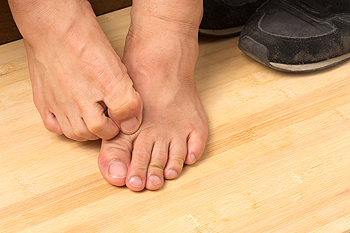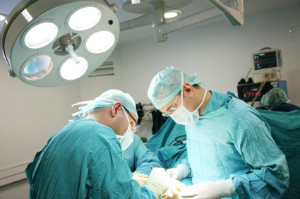Connect With Us
Blog
Items filtered by date: January 2021
Why is My Heel in Pain?
 Heel pain can be debilitating, and it has a variety of causes. Because the heel is the first part of the foot to hit the ground when walking, it can bear the weight of the entire body causing pain during prolonged periods of walking and standing. Plantar fasciitis is the most common form of heel pain. This occurs when the plantar fascia, the ligament running along the bottom of the foot connecting the heel to the toes, becomes inflamed and aggravated. Plantar fasciitis pain is at its worst in the morning or after rest, and it usually subsidies throughout the day. Heel spurs, which are abnormal growths of bone on the heel, can also lead to heel pain. These form when calcium deposits build up on the back of the heel. If you are struggling with heel pain, it is important to consult with a podiatrist for a proper diagnosis and treatment method.
Heel pain can be debilitating, and it has a variety of causes. Because the heel is the first part of the foot to hit the ground when walking, it can bear the weight of the entire body causing pain during prolonged periods of walking and standing. Plantar fasciitis is the most common form of heel pain. This occurs when the plantar fascia, the ligament running along the bottom of the foot connecting the heel to the toes, becomes inflamed and aggravated. Plantar fasciitis pain is at its worst in the morning or after rest, and it usually subsidies throughout the day. Heel spurs, which are abnormal growths of bone on the heel, can also lead to heel pain. These form when calcium deposits build up on the back of the heel. If you are struggling with heel pain, it is important to consult with a podiatrist for a proper diagnosis and treatment method.
Many people suffer from bouts of heel pain. For more information, contact Dr. David Ungar of Personal Foot Care. Our doctor can provide the care you need to keep you pain-free and on your feet.
Causes of Heel Pain
Heel pain is often associated with plantar fasciitis. The plantar fascia is a band of tissues that extends along the bottom of the foot. A rip or tear in this ligament can cause inflammation of the tissue.
Achilles tendonitis is another cause of heel pain. Inflammation of the Achilles tendon will cause pain from fractures and muscle tearing. Lack of flexibility is also another symptom.
Heel spurs are another cause of pain. When the tissues of the plantar fascia undergo a great deal of stress, it can lead to ligament separation from the heel bone, causing heel spurs.
Why Might Heel Pain Occur?
- Wearing ill-fitting shoes
- Wearing non-supportive shoes
- Weight change
- Excessive running
Treatments
Heel pain should be treated as soon as possible for immediate results. Keeping your feet in a stress-free environment will help. If you suffer from Achilles tendonitis or plantar fasciitis, applying ice will reduce the swelling. Stretching before an exercise like running will help the muscles. Using all these tips will help make heel pain a condition of the past.
If you have any questions, please feel free to contact our office located in Farmington, MI . We offer the newest diagnostic and treatment technologies for all your foot care needs.
Arthritis Can Cause Pain in the Feet and Ankles
Understanding Athlete's Foot
 Athlete's foot is a common fungal infection known to be contagious. Common symptoms patients can experience with this ailment can include red itchy skin between the toes and on the bottom of the feet. The skin may also become dry and cracked. The fungus that causes athlete’s foot lives and thrives in warm moist environments that include public swimming pools, shower room floors, and surrounding areas. It is beneficial to wear appropriate shoes while in these areas, in addition to avoid sharing shoes, socks, and towels. There are several treatment options available, and it is strongly suggested that you consult with a podiatrist who can determine which one is most effective for you.
Athlete's foot is a common fungal infection known to be contagious. Common symptoms patients can experience with this ailment can include red itchy skin between the toes and on the bottom of the feet. The skin may also become dry and cracked. The fungus that causes athlete’s foot lives and thrives in warm moist environments that include public swimming pools, shower room floors, and surrounding areas. It is beneficial to wear appropriate shoes while in these areas, in addition to avoid sharing shoes, socks, and towels. There are several treatment options available, and it is strongly suggested that you consult with a podiatrist who can determine which one is most effective for you.
Athlete’s foot is an inconvenient condition that can be easily reduced with the proper treatment. If you have any concerns about your feet and ankles, contact Dr. David Ungar from Personal Foot Care. Our doctor will treat your foot and ankle needs.
Athlete’s Foot: The Sole Story
Athlete's foot, also known as tinea pedis, can be an extremely contagious foot infection. It is commonly contracted in public changing areas and bathrooms, dormitory style living quarters, around locker rooms and public swimming pools, or anywhere your feet often come into contact with other people.
Solutions to Combat Athlete’s Foot
- Hydrate your feet by using lotion
- Exfoliate
- Buff off nails
- Use of anti-fungal products
- Examine your feet and visit your doctor if any suspicious blisters or cuts develop
Athlete’s foot can cause many irritating symptoms such as dry and flaking skin, itching, and redness. Some more severe symptoms can include bleeding and cracked skin, intense itching and burning, and even pain when walking. In the worst cases, Athlete’s foot can cause blistering as well. Speak to your podiatrist for a better understanding of the different causes of Athlete’s foot, as well as help in determining which treatment options are best for you.
If you have any questions please feel free to contact our office located in Farmington, MI . We offer the newest diagnostic and treatment technologies for all your foot and ankle needs.
Why Might Someone Need Foot Surgery?
 Foot surgery may be necessary for a variety of conditions when nonsurgical methods do not yield results or when the condition is severe. Depending on what is causing it and its severity, chronic foot pain may require surgery. A foot injury, such as a fracture or ruptured Achilles tendon may require surgery as well. Foot deformities, including bunions, hammertoes, and bone spurs may need to be surgically corrected if they cause significant symptoms and conservative treatment methods are ineffective. Other conditions that could warrant surgery include arthritis and neuromas. If you are experiencing foot pain, it is recommended that you consult with a podiatrist who can help find the right treatment for you.
Foot surgery may be necessary for a variety of conditions when nonsurgical methods do not yield results or when the condition is severe. Depending on what is causing it and its severity, chronic foot pain may require surgery. A foot injury, such as a fracture or ruptured Achilles tendon may require surgery as well. Foot deformities, including bunions, hammertoes, and bone spurs may need to be surgically corrected if they cause significant symptoms and conservative treatment methods are ineffective. Other conditions that could warrant surgery include arthritis and neuromas. If you are experiencing foot pain, it is recommended that you consult with a podiatrist who can help find the right treatment for you.
Foot surgery is sometimes necessary to treat a foot ailment. To learn more, contact Dr. David Ungar of Personal Foot Care. Our doctor will assist you with all of your foot and ankle needs.
When Is Surgery Necessary?
Foot and ankle surgery is generally reserved for cases in which less invasive, conservative procedures have failed to alleviate the problem. Some of the cases in which surgery may be necessary include:
- Removing foot deformities like bunions and bone spurs
- Severe arthritis that has caused bone issues
- Cosmetic reconstruction
What Types of Surgery Are There?
The type of surgery you receive will depend on the nature of the problem you have. Some of the possible surgeries include:
- Bunionectomy for painful bunions
- Surgical fusion for realignment of bones
- Neuropathy decompression surgery to treat nerve damage
Benefits of Surgery
Although surgery is usually a last resort, it can provide more complete pain relief compared to non-surgical methods and may allow you to finally resume full activity.
Surgical techniques have also become increasingly sophisticated. Techniques like endoscopic surgery allow for smaller incisions and faster recovery times.
If you have any questions please feel free to contact our office located in Farmington, MI . We offer the newest diagnostic and treatment technologies for all your foot and ankle needs.
Swollen Feet, Causes, and Remedies During Pregnancy
 A common symptom of pregnancy is swollen feet. This can happen for a variety of reasons, including an increase in blood circulation, the weight of the unborn baby, or from sitting for extended periods of time. Additionally, eating foods that contain large amounts of sodium may contribute to swollen feet and ankles. It is beneficial to perform gentle stretches daily, and mild relief may be found when exercise is performed on a regular basis. Drinking approximately eight glasses of water during the day may also help to alleviate swollen feet. If you would like more information about your foot concerns during pregnancy, it is suggested that you confer with a podiatrist.
A common symptom of pregnancy is swollen feet. This can happen for a variety of reasons, including an increase in blood circulation, the weight of the unborn baby, or from sitting for extended periods of time. Additionally, eating foods that contain large amounts of sodium may contribute to swollen feet and ankles. It is beneficial to perform gentle stretches daily, and mild relief may be found when exercise is performed on a regular basis. Drinking approximately eight glasses of water during the day may also help to alleviate swollen feet. If you would like more information about your foot concerns during pregnancy, it is suggested that you confer with a podiatrist.
Pregnant women with swollen feet can be treated with a variety of different methods that are readily available. For more information about other cures for swollen feet during pregnancy, consult with Dr. David Ungar from Personal Foot Care. Our doctor will attend to all of your foot and ankle needs.
What Foot Problems Can Arise During Pregnancy?
One problem that can occur is overpronation, which occurs when the arch of the foot flattens and tends to roll inward. This can cause pain and discomfort in your heels while you’re walking or even just standing up, trying to support your baby.
Another problem is edema, or swelling in the extremities. This often affects the feet during pregnancy but tends to occur in the later stages.
How Can I Keep My Feet Healthy During Pregnancy?
- Wearing orthotics can provide extra support for the feet and help distribute weight evenly
- Minimize the amount of time spent walking barefoot
- Wear shoes with good arch support
- Wear shoes that allow for good circulation to the feet
- Elevate feet if you experience swelling
- Massage your feet
- Get regular, light exercise, such as walking, to promote blood circulation to the feet
If you have any questions, please feel free to contact our office located in Farmington, MI . We offer the newest diagnostic and treatment technologies for all your foot care needs.


